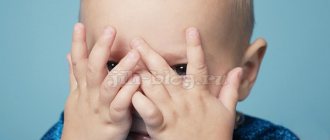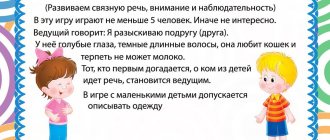How does the 3-year crisis proceed?
This crisis usually occurs between 2.5 and 3.5 years of age. According to the observations of some psychologists, it sometimes shifts and begins about six months later, that is, it can begin at 4 years. The 3-year-old crisis is associated with the beginning of the formation of the child’s personality and character.
The following signs indicate a crisis:
- Negativism is not disobedience in its pure form, when a child does not obey because he does not want to do something, but the desire to do something in defiance of an adult. This manifests itself in actions and conversation.
- Stubbornness - a child stubbornly strives for something, even if he doesn’t need it, he doesn’t feel any pleasure from what he ultimately received.
- Protest - the baby openly rebels against what is stable and familiar.
- Willfulness - a child strives with all his might to do something on his own, although he understands that without the help of an adult he will not be able to do anything.
- Depreciation manifests itself in the fact that the child begins to be deliberately rude, call his parents names, breaks his favorite toys, and in his speech there are many words denoting negative properties.
- Despotism often occurs among only children in the family. The child turns into a real little tyrant, whose will must be strictly obeyed. This usually happens if everyone in the family indulges the child’s wishes.
- Jealousy mainly occurs in families with several children. The child is jealous of his mother or father towards brothers and sisters who are not necessarily younger than him.
Why does the crisis manifest itself this way and not otherwise? As the child grows up, he strives to demonstrate and assert his independence in literally everything:
- his desires and opinions are equivalent to the desires and opinions of his parents; “I want” is equivalent to “need”;
- you need to do everything yourself, better than an adult, even if it doesn’t work out or isn’t necessary;
- the desire to explore everything around without the help of adults.
The negative result of these attempts causes hysteria and scandals.
With the right approach, the crisis passes quickly enough and subsequently has a beneficial effect on character. If it drags on, then parents need to reconsider their behavior towards the child; most likely, they chose the wrong tactics.
Junior group. Early childhood, nursery. Children 1-4 years old
Summary of a complex lesson with elements of psychological training for children 1.5–2 years old “Feelings are more important than words” MDOU “Kindergarten No. 157”
Summary of a complex lesson with elements of psychological training for children 1.5–2 years old. “Feelings are more important than words”
Prepared by: teacher-
psychologist Mikhailova A.L. Yaroslavl 2021 “Feelings are more important than words”
Equipment. Boxes Masha and the Bear, hoop, ribbons,…
Emotional perception of beauty by young children in music classes Emotional perception of beauty by young children in music classes Early childhood is a period of intense physical and mental development . At this stage, fundamental human abilities are laid. The period of early childhood is unique and...




